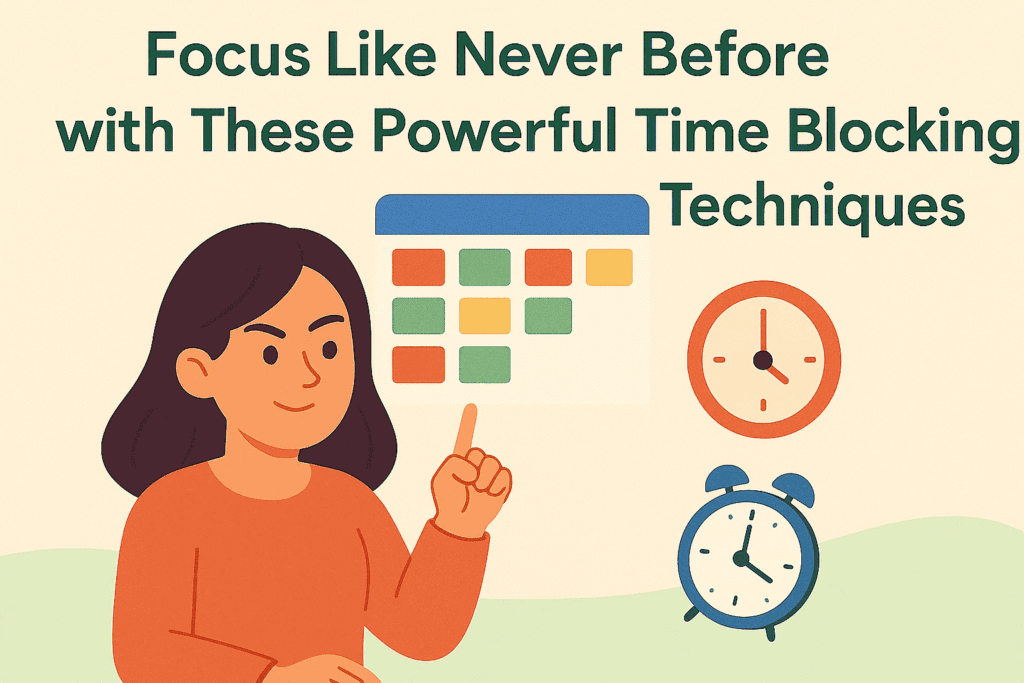Why I Was Drowning in To Do Lists Until I Tried This
I used to think multitasking was a superpower. I’d juggle college classes, freelance gigs, scrolling endlessly through social media, and binge watching whatever Netflix recommended. But my to do list never got shorter. I always felt behind, and the anxiety of uncompleted tasks weighed on me like a cloud. Then I discovered time blocking techniques for better focus, and everything started to change.
One late night, panicked over a missed deadline and surrounded by snack wrappers and guilt, I finally asked myself what’s really stopping me from doing what I need to do?
The answer wasn’t laziness. It was lack of structure. And that’s exactly what time blocking gives you.
The Secret Behind People Who “Have It All Together”
Have you ever looked at someone and wondered how they manage it all? Classes, jobs, social life, workouts, clean rooms, and glowing skin? Let me let you in on a secret: most of them aren’t doing more they’re just planning smarter.
Time blocking is a strategy where you divide your day into blocks of time and assign a specific task to each block. Instead of vaguely deciding to “study today,” you tell yourself “From 2 to 4 PM, I’ll revise Biology.” The clarity is powerful. The focus is deeper. The guilt? Gone.

How to Start Time Blocking Without Getting Overwhelmed
Starting small is key. Here’s how I transitioned from chaotic mess to (mostly) organized human:
- Identify Your Priorities
Choose 3 things that truly need your attention today. That’s it. Not 10. Just 3. - Create Time Blocks for Each
Use a digital calendar or a notebook. Block time realistically don’t schedule a 3 hour study session at 6 AM if you hate mornings. - Include Breaks and Life Stuff
Add blocks for lunch, calls with friends, even doom scrolling yes, seriously. Time blocking isn’t about perfection, it’s about intention. - Protect Your Focus
When the time block arrives, do only that one thing. No toggling between apps. No just checking Instagram. One block, one focus.
A Story From a Reader Like You
“I’m a design student and deadlines were literally my nightmares. I’d always start late, stress out, and cry into my sketchpad. Time blocking felt too rigid at first, but once I made it flexible, like adding creative hours and buffer time, it became my safety net. Now I feel like I’m in charge of my time, not chasing after it.”
Arfa K., 21, Student in Riyadh
Why This Works for the Overwhelmed and the Ambitious
Time blocking isn’t just for CEOs or productivity nerds. It’s for students, parents, freelancers, creatives anyone who feels like 24 hours are never enough.
Because it forces you to confront your time honestly. It reveals how often we overbook ourselves, or pretend we’ll have more energy later.
When used consistently, time blocking techniques for better focus can retrain your brain to value single tasking, reduce mental clutter, and yes even help you sleep better at night.
Where You Can Learn and Apply It Easily (Even for Free)
You don’t need an expensive app. Start with:
- Google Calendar: Free, easy to color code blocks
- Notion or Trello: If you like visuals
- Pen and Paper: Still the best for many brains
Need a push? There are free templates all over the internet, or you can DM creators on platforms like Pinterest who often share low cost productivity kits.
FAQs
1. Is time blocking too rigid for creative people?
Not at all. You can block “creative free time” or “open ideation” windows. Flexibility is built into your plan when you create the rules.
2. What if I don’t follow my time blocks perfectly?
That’s okay! Time blocking is a guide, not a punishment. You can always adjust and learn from the day’s rhythm.
3. Can time blocking help with anxiety or burnout?
Yes. It reduces the overwhelm of decision fatigue and creates structure, which helps many people feel calmer and more in control.
The Line You Need to Hear Today
You are not lazy. You are not broken. You’ve just been trying to outrun your time instead of dancing with it.
Start with one block. One hour. One choice.
You’ll be surprised how much peace lives in that single decision.
Also Check Time Slipping Away? Unmasking the Negative Effects of Social Media Habits By Foncentra Team


Pingback: Why Rediscovering Silence in a Noisy World is the Ultimate Act of Self-Care - foncentra.com